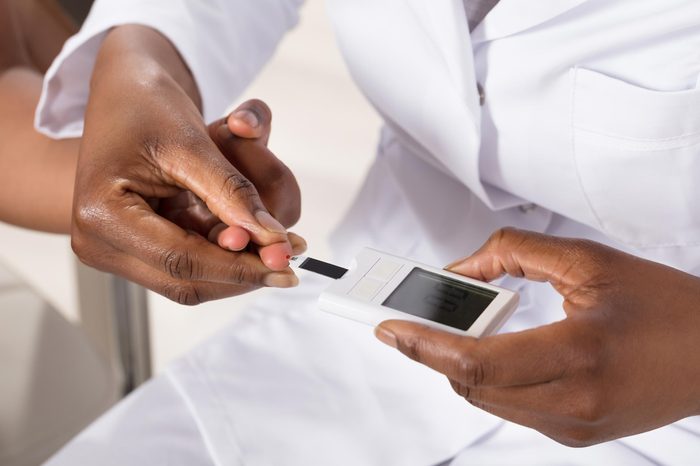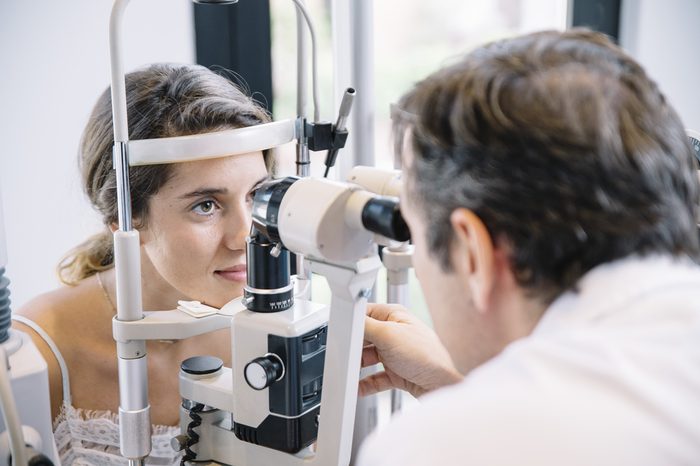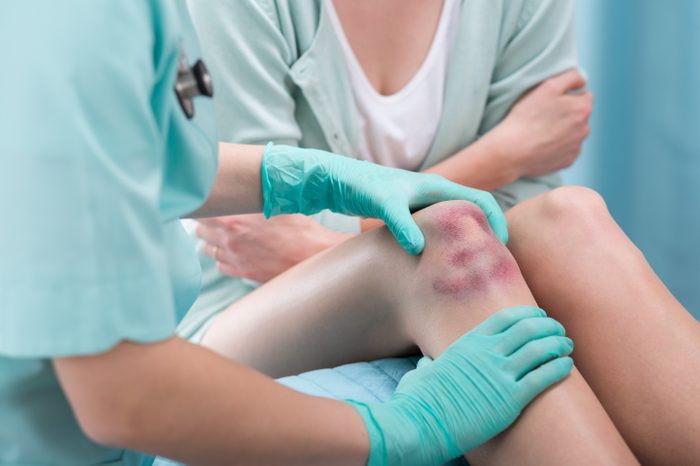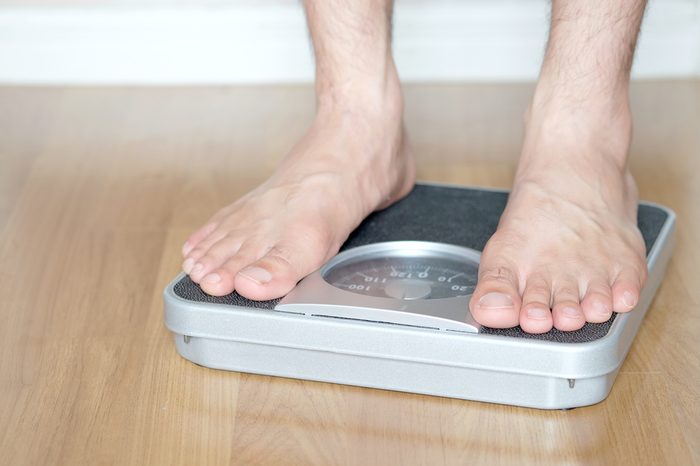
Pressure or tightness in the jaw, neck, or arms
Believe it or not, you might be having a heart attack—particularly if you’re a woman. Women under 55 who have had a heart attack are actually more likely to have experienced lesser-known symptoms like this. According to a study published in Circulation, they are also more likely to have experienced three or more cardiac symptoms other than chest pain. These signs often accompanied with chest pain. But, for 13% of women, they’re not. The problem is, these symptoms are often misinterpreted or ignored, even by doctors. This puts women at an increased risk of dying compared to men of the same age. So be aware, be smart, and be your own best advocate.
9 Sneaky Female Heart Attack Symptoms Women Might Be Ignoring

Leg pain that occurs only on one side
The likely culprit is a pulled muscle. If the area is also swollen and warm, however, and symptoms get worse even after you elevate your leg, it could be a life-threatening condition called deep vein thrombosis (DVT). It’s a blood clot that forms in an interior vein, usually in the lower leg or thigh. The good news? It’s treatable. The bad? If not caught in time, DVT can be fatal if the clot breaks off and travels to the lungs. Risk factors include not moving around on a long plane ride, recent surgery or illness that caused you to be sedentary, and taking birth control pills or hormone replacement therapy.

Sudden flashes of light or an increase in floaters
A few flashes of light and even a couple of floaters—dark squiggly lines in your line of sight—are normal. According to Harvard Health Publishing, around a quarter of people in their 60s have floaters. That number rises to two-thirds by age 80. They’re also more common if a person is nearsighted or has diabetes. However, if the symptoms come on suddenly—or increase—you should see a doctor as soon as possible. They could signal a torn retina, which could then lead to a detached retina and permanent vision loss. Early detection and treatment—usually with lasers or cryotherapy, which utilizes extreme cold to reattach the retina to the back wall of the eye—is crucial to avoiding blindness.

Persistent headaches
Don’t assume the worst if headaches are plaguing you. You might just need glasses or some antihistamines. “Persistent headaches can be a sign of something as simple as chronic allergies or sinus pressure,” says Kay Durairaj, MD, who specializes in head and neck surgery as well as facial plastic surgery. “Or they could be as complex as a brain tumor or stroke.”
How can you tell the difference? Try some reading glasses or allergy medicine first to see if that solves the problem. But pay attention to all of your symptoms: “Anytime a headache is accompanied by nausea, vomiting, or visual changes, it’s a serious sign that it must be evaluated immediately,” Dr. Durairaj adds. “If it’s related to a stroke, symptoms like facial asymmetry, arm weakness, and slurred speech are also warning signs.”
Here’s How Kristin Chenoweth Overcame Years of Chronic Migraine Headaches

Sudden groin pain
Men, pay attention: If you feel as if you’ve suffered a kick to your private parts without actually getting kicked in your private parts, you might need surgery ASAP—like, ideally within the next four hours. It could be testicular torsion, a rare condition that occurs when one of the spermatic cords gets twisted, often as the result of a common congenital defect or from an infection of the epididymis, where sperm is stored. According to the Mayo Clinic, if you delay treatment for longer than 12 hours, there’s a 75% chance you could lose your testicle.

Excessive urination
How much is too much? According to the Cleveland Clinic, you’re peeing excessively if you have to go more than eight times in 24 hours. Before you head to the doctor, try consuming fewer liquids, especially those with caffeine or alcohol. If your lifestyle doesn’t seem to be an issue, though, excessive urination could be a symptom of diabetes mellitus, diabetes insipidus, a urinary tract infection, a kidney problem, a mass pressing against your bladder, an STD like chlamydia, or prostate problems.
Here’s How Much Liquid Your Bladder Can Actually Hold, a Urologist Reveals

Flulike symptoms accompanied by a stiff neck
When you have the flu, it’s normal to feel achy. But if you have extreme discomfort in your neck and you have trouble touching your chin to your chest, you need to see a doctor right away. Meningitis attacks the membrane that protects the brain and spinal cord. In fact, the bacterial form of it can be deadly—sometimes killing within just a few hours. Other symptoms can include increased sensitivity to light, confusion, and a rash. But sometimes meningitis symptoms don’t look like meningitis. By the time the rash appears, the disease is often in a very advanced state and may not respond to treatment.

Moles that itch or bleed
The body is a wonderland, made up of freckles, beauty marks, and moles. Most of these pose no threat. But if any start to itch or bleed, they need to be checked out immediately, because it could be a symptom of melanoma. The American Academy of Dermatology says to follow the ABCDE rules when it comes to moles: Asymmetry, border, color, diameter, and evolving. Changes in any of those categories can be red flags.
The Scalp Skin Cancer and Brain Connection, Plus 6 Quality Scalp Sunscreen Products

Fruity-smelling breath
It sounds innocuous and even kind of sweet, but it could be a sign of undiagnosed diabetes. It’s one of the symptoms of diabetic ketoacidosis, and it means your blood sugar is spiking because your body doesn’t have enough insulin. As your body tries to deal with this problem, it starts breaking down fatty acids. Acidic chemicals called ketones start accumulating and one, acetone, is responsible for this distinctive fruity smell. If you’re also experiencing fatigue, dry mouth, or labored breathing, get to the ER right away.

Less time between menstrual cycles
“One of the most important signs that a female reproductive system is declining is a subtle and slow reduction in the number of days between menstrual cycles,” says Shahin Ghadir, MD, an ob-gyn and a founding partner of the Southern California Reproductive Center. “For example, normal menstrual cycles are 28 days apart, but if they start to cycle every 27 days and then 26 days apart, this is the first signal that there is a reduction in fertility potential.” If this happens as you’re trying to get pregnant, you might want to start IVF sooner rather than later. If pregnancy isn’t yet in your plans, Dr. Ghadir suggests looking into freezing your eggs. Whatever your particular situation, talk with your doctor. Cycles that are shorter than 20 days could also signal polycystic ovary syndrome (PCOS), as well as uterine polyps or a thyroid disorder.

Sudden vision changes
Don’t write off a sudden sight issue—such as double vision, blurred vision, or loss of vision in one eye—as a sign that you just need to rest your tired eyes. Sudden eyesight problems could be a sign of a stroke (when a clot or rupture reduces blood flow to the brain). Experts warn that you shouldn’t wait if you experience any sudden, significant vision problem; call 911 immediately. Certain treatments, such as medications that counteract clots, need to be provided three to four hours after the onset of symptoms in order to be effective.

Skin-color changes, accompanied by rapidly worsening pain
If a wound site looks and feels much worse within 24 hours—at first very red, then purple and blistered—head to the emergency room immediately. This could be a sign of necrotizing fasciitis, more commonly known as flesh-eating bacteria. Another early sign is pain that seems too severe for the type of injury incurred. “A delay in a diagnosis of this bacteria can lead to amputation or even death,” says Vijay Rajput, MD, chair and professor of medical education at Nova Southeastern University. “Surgeons need to immediately remove the pus and the dead tissue to prevent further spreading of infection, which tends to spread rapidly within hours or a few days.”

Shortness of breath
You should expect to be huffing and puffing after working out. But if you become breathless while doing everyday activities, there could be a problem with your heart or lungs. According to the American Lung Association, shortness of breath is associated with chronic conditions like asthma, tuberculosis, pulmonary edema, fibrosis, lung cancer, heart disease, and obesity. It’s also linked to some acute conditions, such as heart attack or heart failure, pulmonary embolism, Guillain-Barré syndrome, anemia, pneumonia, an allergic reaction, and even carbon monoxide poisoning. The list of possibilities is long, but what you should do is clear. Don’t take breathing problems lightly, especially if you’re also experiencing other troubling symptoms. Just go see a doctor—possibly right away.
Lung Cancer Is Worst in These 8 States, New National Report Says

Coughing up or vomiting blood
This symptom will likely send you running to the nearest doctor—and it should. The most common and non-life-threatening cause is acute bronchitis. Another relatively benign source can be bleeding outside the lungs and airways, such as from a bad nosebleed. It can also point to much more serious problems, though, such as lung cancer, pulmonary embolism, congestive heart failure, and tuberculosis. TB is rare in the United States, but it is highly contagious. For treatment, you will need to be on antibiotics for at least six to nine months.

A dull pain around your belly button
When you think of appendicitis, you probably think of sharp, shooting pains in your midsection. While those pains will come later, dull discomfort around the navel is an earlier warning sign. Other symptoms may include a loss of appetite, fever, nausea, and vomiting. If it is appendicitis, you’ll likely need surgery—and quickly—because if your appendix bursts, it could cause a serious infection throughout your abdomen.

Sharp abdominal pain
Depending on where—and how severe—the pain is, the cause could be relatively normal or deadly. Gas pains or food poisoning could be the culprit. More serious conditions include irritable bowel syndrome, appendicitis, gallbladder issues, bowel obstructions, colitis, diverticulitis, pancreatitis, kidney stones, and stomach ulcers. The bottom line, according to Dr. Rajput: “It is a big deal when you have any type of pain that is progressing rapidly and not getting better. If it hurts more when you move, you need to go to the doctor to find the true nature of the pain.”
5 Subtle Signs Your Back Pain Means Something Serious, from a Spinal Surgeon

A “thunderclap” headache
“Sudden” and “severe” ae the best descriptions for this type of head pain. Thunderclap headaches reach maximum force within 60 seconds. They last for at least five minutes, according to the American Migraine Foundation, and they seemingly come out of nowhere. This might just be a simple—but painful—headache. But it could also signal a brain bleed or clot, leaking cerebrospinal fluid, a spike in blood pressure, a stroke, or a serious infection like meningitis or encephalitis, according to the Mayo Clinic. Don’t wait around—see a doctor right away.

Ringing in your ears
The fancy word for this very common affliction is tinnitus, and it affects one in five people. While annoying, it’s generally not dangerous. It’s often just the result of age-related hearing loss, noise exposure, or even a buildup of earwax.
However, as the Mayo Clinic explains, it can also be a symptom of other conditions, such as a blood vessel disorder, a tumor, or Meniere’s disease. If you have the ringing in only one ear, that could be more problematic. “Asymmetric tinnitus can be a sign of an acoustic tumor or an aneurysm, and it should be further evaluated with an MRI,” says Dr. Durairaj. “Ears are sensitive predictors of central nervous system health, and any drastic changes in hearing function should not be ignored.” Talk to your doctor if your tinnitus doesn’t go away or returns, or if you’re concerned.

During pregnancy, you feel decreased movement from the baby
First, see if you can get your baby moving by drinking some juice and lying on your left side. If you still don’t feel any movement, head straight to the hospital, advises Carolyn Alexander, MD, an ob-gyn at Southern California Reproductive Center. “Time is of the essence because the umbilical cord supplies blood to the baby,” she says, “and if it is compromised, the baby may need to be delivered immediately.”

Abnormal swelling while pregnant
You may feel as if you’re swollen everywhere when you’re pregnant. That feeling is a problem, however, when the swelling is visible and extreme—and localized in your face, hands, and feet. That could be a sign of preeclampsia, which happens when your blood pressure skyrockets and your kidney function is compromised. Preeclampsia is dangerous and potentially fatal when not treated. If diagnosed with it, you will be monitored closely by your doctor, who may prescribe blood pressure medication and recommend rest. Depending on the severity of your case and how far along you are in the pregnancy, you may also need to deliver before your due date.

Extreme itchiness during pregnancy
Some itchiness is normal when you’re pregnant, especially as your skin expands over your growing belly. Intense and constant itchiness isn’t. It could be a symptom of intrahepatic cholestasis of pregnancy (ICP), which can harm the liver and triple the risk of stillbirth. According to the American Liver Foundation, ICP affects one out of every 1,000 pregnancies. In addition to the itchiness, those affected may have dark-colored urine, light-colored bowel movements, and yellow-tinted eyes or skin. But even if you only have the itchiness, see a doctor right away to have your liver function tested.
Pregnant and Itching? An OB-GYN Who Experienced This Says It Could Mean a Certain Liver Condition

Bloating
Bloating is uncomfortable and annoying when you’re trying to button your pants, but if it lasts more than a week, you should be evaluated by a physician. According to Dr. Alexander, bloating can be put into gynecological (hormone imbalance, ovarian cysts or cancer, pelvic infection, fibroids), gastrointestinal (irritable bowel syndrome, Crohn’s disease, ulcerative colitis), and genitourinary (bladder) categories. “It may signify an ovarian cyst or fluid that can be natural during ovulation,” she says, “but if it is persistent, it is concerning.”

Tingling that radiates down your arm
We always see people clutching their chest when they’re having a heart attack on TV. While severe chest pain or pressure is a classic sign, a strange, numb feeling that starts in your chest and moves down your arm is another common symptom. If this feeling persists for more than 30 minutes and you also start experiencing dizziness or nausea, you need emergency medical attention.
If, however, the tingling subsides when you change position, it could be a pinched nerve. Other possibilities include angina, bursitis, a herniated disc, a torn rotator cuff, and vascular thoracic outlet syndrome.

Fatigue
It’s easy to think of fatigue as a natural symptom of life. But as busy as we are, it’s not normal to be bone-crushingly tired and devoid of energy all the time. Serious causes include sleep apnea, chronic fatigue syndrome, anemia, diabetes, and clinical depression. If some R&R doesn’t make you feel bright-eyed and bushy-tailed, you should talk to your doctor.

Nipple discharge
Statistics suggest that nipple discharge is the third most commonly reported breast-related concern, but it’s not always serious. Women can experience a milky discharge for up to three years after they stop nursing. It could also be a side effect of taking birth control pills or other medication. A green-tinged discharge could point to a cyst underneath the nipple or areola, and bloody discharge could be caused by a papilloma, a benign tumor. Bloody discharge or clear discharge from one breast could also indicate breast cancer.
8 New Breast Cancer Treatments Some Oncologists Are Calling ‘Mind-Blowing’

Dimples on your breast
Dimples in your smile are cute; on your breast, they could be a symptom of breast cancer. What you’re seeing might be the result of a tumor growing in the breast tissue and pulling the skin toward it, or of tumor cells blocking the breast’s lymphatic channels. “Early detection is important,” reminds Dr. Alexander. “Women most commonly come in because they felt something versus catching it on a routine screening.”

Heartburn that doesn’t go away
If you find yourself popping antacid pills regularly, you might want to take the time to find the source of your discomfort. If you change your diet for the better and take steps to remove stress, but you’re still suffering, it could be a sign of stomach or throat cancer. Alternatively, it could cause the condition known as Barrett’s esophagus, in which your stomach acid damages the lining of the esophagus and, ultimately, could put you at a higher risk for esophageal cancer.

Excessively long or heavy menstrual cycles
While “normal” is different for every woman you should be concerned if your period lasts much more than seven days, or if you’re having two periods a month. According to the Mayo Clinic, that could be a sign of cervical cancer. If this happens more than two months in a row, you should talk to a doctor. Other possible diagnoses: PCOS, uterine polyps, or uterine cancer.

Sudden confusion or change in mental status
“Whenever someone has a change in mental status that is not caused by substance abuse, intoxication, or withdrawal of medications, they should immediately see a doctor,” says Dr. Rajput. “In addition, if the confusion occurs while the person has a fever, they are at a higher risk of infection of the brain, such as meningitis and encephalitis.” Sudden confusion can also be the result of a head injury, a reaction to a new medication, dangerously low blood sugar, or a neurological problem, such as a stroke. Whatever the root cause, immediate medical attention is necessary.
15 Stroke Symptoms in Women We Too Often Ignore, Say Neurology & Heart Doctors

Extreme lethargy after inhaling water
You might assume that having a near-drowning experience would be physically and mentally exhausting, and you’d be right—but extreme lethargy after a situation like this is not normal. Even an incident that doesn’t seem particularly dramatic can be problematic, especially in children, and cause dry or secondary drowning. While rare, these conditions can cause death hours or even days after an incident, causing the vocal cords of an affected person to close up in the case of dry drowning, or causing fluid buildup in the lungs in the case of secondary drowning. Other signs after a near-drowning that should get you to the hospital right away: coughing, chest pain, trouble breathing, fever, and irritability.

Abnormal-looking nails
They’re not just for biting or for covering with the season’s trendiest nail polish: Your nails are a window into your health, and different nail conditions can indicate various conditions. Pale nails could point to anemia, congestive heart failure, liver disease, or malnutrition; bluish nails could mean that you’re not getting enough oxygen and may have a lung or heart problem; a dark line under the nail could be melanoma.

A regular nighttime cough
If you’re not recovering from a chest cold or battling allergies, yet you’re coughing every night in bed, you could have an early sign of congestive heart failure. The Mayo Clinic explains that this happens because fluid builds up in the chest and heart when you’re lying flat for an extended period of time; that fluid can cause you to cough. While this doesn’t mean that a heart attack is imminent, your condition will worsen over time if you don’t address it.

Blood in your stool
While frightening to see, blood in your stool is usually not serious. The two most common culprits are hemorrhoids and anal fissures. If the symptoms don’t go away on their own or get better with treatment, however, you might be looking at a more serious problem, such as inflammatory bowel disease. “Another link to blood in your stools is a risk of colon cancer,” Dr. Rajput says, “especially if it runs in your family and if you’re over 50.”

Abnormally colored stool
Weirdly colored poop may not just be a result of what you’ve been eating. Black stool, for example, could result from taking iron pills or certain medications (like antidepressants or codeine)—or it could be a sign of bleeding in your gastrointestinal tract. What you’re seeing might be blood that has been processed through your digestive system. On the flip side, very light-hued stool could mean that your liver isn’t functioning properly, and yellow stool could point to a malabsorption disorder such as celiac disease.
Types of Poop and What Your Stool Can Tell You About Your Health

A sharp, “tearing” pain in your upper back
If this severe pain comes on suddenly, there’s a very serious possibility that you have an aortic dissection. This condition most commonly occurs in elderly people with uncontrolled blood pressure. It happens when the inner layer of a weak artery tears and blood starts gushing through the new hole, causing the inner and middle layers to “dissect” (or separate). Up to 20% of people who suffer an aortic dissection will go on to have an acute rupture, and that could be fatal within seconds. Pain also sometimes starts in the chest and presents much like a heart attack. Either way, you’ll want to see a doctor, because you’ll likely need emergency surgery.

Vertigo
If this freaky, spinning, dizzy feeling happens regularly for more than 30 seconds at a time, talk to a doctor. “Vertigo is complex and generally signifies an inner ear problem,” says Dr. Durairaj. “It can happen from an acute infection when there’s pain and a ruptured eardrum, or it can happen suddenly from dislodging inner-ear calcium particles responsible for balance.” Less common reasons for vertigo are a stroke, a brain tumor, new medication, and migraines.

Swollen and red joints
While aches and pains may be a sign of injury, if the skin is also red and warm to the touch, it could indicate a serious infection. Bacterial or septic arthritis—caused when bacteria infiltrate the area, according to the Mayo Clinic—progresses quickly and damages cartilage and bone. Getting treatment early is the key to avoiding permanent joint disability and, in the worst-case scenario, sepsis. The two demographic groups most affected by bacterial arthritis are children (who tend to get it in their hips and shoulders) and the elderly (who see it in their arms and knees).
These Gentle Exercises May Be the Key to a Longer Life, Say Experts

Itchy lips or throat
You might be experiencing anaphylaxis, an extreme allergic reaction, and you should act quickly. Swelling usually occurs after initial signs like itchiness, hives, redness, and even a general anxiety that something somewhere in your body is “off.” While allergic reactions aren’t uncommon, when they involve your lips or tongue, they can make breathing difficult or impossible. You should seek medical attention immediately in this situation.
An important note: Even after your allergic reaction calms down, see a doctor in case of a secondary reaction and to help avoid future ones.
How to Get Rid of Allergies, According to Allergy & Immunology Doctors

Night sweats
If this happens once in a while, don’t worry: You might be fighting off a minor infection, or you might have had a bad dream and your body is having a “sympathetic surge.” However if it’s chronic, lasting for weeks or months, it could be the result of hormonal changes or a side effect of certain medications. On the more serious end of the spectrum, night sweats could be a sign of cancer, such as lymphoma, leukemia, or colon cancer. Night sweats could also be a systemic symptom of colon cancer, caused by the immune system trying to fight off the disease.
What Are the Best Foods to Fight Cancer? Here’s What’s in a Cancer Dietitian’s Fridge

Painful sex
For women, pain during penetration might result from too little lubrication, injury to the area, inflammation, or an infection. A deeper pain, however, might be caused by ovarian cysts, pelvic inflammatory disease, fibroids, or endometriosis. “Endometriosis is one cause of pelvic pain—pain with intercourse and also pain with menses and sometimes painful bowel movements,” explains Dr. Alexander. “It can lead to scar-tissue formation in the pelvis and may need surgery to remedy it.” Bottom line: Sex should be pleasurable, and if it’s not, something may be wrong.

Feeling full quickly despite not eating a lot
This might sound like a blessing, but if you’re a woman it could signal a deadly problem. According to the American Cancer Society, around 22,000 women are diagnosed with ovarian cancer every year—and about 85% of cases are found late, when survival odds dip. A feeling of fullness after eating little food or a general loss of appetite can be early signs of this cancer; so are increased abdominal size, bloating, pelvic pain or pressure, and urinary problems.

Increased bruising
Most of the time, bruising isn’t a big deal. However, an increase in bruising could also signify a vitamin K or C deficiency, leukemia, or liver disease. Mention it to your doctor at your next appointment—and get checked out sooner if a bruise doesn’t seem to improve in two weeks or if you are also running a fever or experiencing weight loss.
5 Ways Menopause Changes Your Skin (with Solutions!), from a Cosmetic Surgeon

Hot flashes
Older women expect this telltale sign of menopause—that sudden, sweaty feeling that hits you out of the blue—but younger women? It happens, but don’t ignore it: “It’s a very important marker of declining fertility and should never be ignored,” says Dr. Ghadir. “If women are entering menopause at a young age, this may be an early sign of hormonal derangement.” Since hot flashes result from low estrogen, hormone replacement therapy may be recommended.

Feeling like something is stuck in your eye
Eye irritation can result from dirty air, allergies, and other temporary causes. But if you have lasting pain or that annoying feeling doesn’t go away even after you’ve rinsed out and rested your eye, you may have a scratch on your cornea, the clear, protective layer that covers your iris and pupil. You may also experience blurred vision, eye pain, sensitivity to light, and difficulty opening your eye. A doctor can safely treat the problem and prescribe antibiotics to avoid infection; these measures, along with possibly covering the affected eye until it heals, can prevent long-term vision damage.

Hoarseness that doesn’t go away
If laryngitis lasts more than a few weeks, it may be a symptom of gastroesophageal reflux disease, or GERD, a condition that causes stomach acids to back up into the esophagus, resulting in irritation. You might notice that your voice sounds worse right when you wake up, since the condition is exacerbated when you’re lying down. Cancer may also be a cause: “A scratchy voice may serve as an early sign of head and neck cancers,” Dr. Rajput explains, “due to the fact that malignancies can directly affect a patient’s voice box or damage the nerves that control it, paralyzing vocal cords.”

Difficulty swallowing
If you feel as if something is stuck in your throat and you’re having trouble swallowing, get it checked out. The medical term for this is dysphagia, and it could lead to weight loss and a nutrient deficiency, as well as aspiration pneumonia, in which liquid or food enters the lungs and causes a bacterial infection. And that’s not even taking into account potential underlying causes, such as GERD or a head, neck, or esophageal tumor; there may also be neurological or muscular causes.

Unexplained weight loss
If you haven’t made any changes to your diet or exercise routine and you’re still shedding pounds, you might have an overactive thyroid, celiac disease, pancreatitis, diabetes, rheumatoid arthritis, or cancer, to name a few possible causes. People who lose 5% of their body weight in six months without cause should see a doctor.
Do You Have an Under-active Thyroid? This 90-Second Quiz Helps You Find Out

Back pain, often with fever and nausea
If you are experiencing this, chances are your urinary tract infection has morphed into a full-blown kidney infection. Not only is it painful, but without treatment, it can lead to sepsis and organ failure. Experts advise skipping DIY remedies like drinking cranberry juice (it mainly works for prevention, not treatment). Instead, head straight to the doctor for antibiotics, which should clear things up quickly.

Dull cramping in your legs
This type of leg exhaustion is a sign of peripheral vascular disease (PVD); it signals poor circulation caused by narrowing blood vessels. The symptoms get better with rest, and worsen with physical activity. Risk factors for PVD include having atherosclerosis, blood clots, or diabetes, as well as being over age 50 and obese, sedentary, or with a family history of premature heart attacks or strokes, according to Johns Hopkins Medicine. If you are diagnosed with PVD, doctors will likely recommend lifestyle changes (e.g., quitting smoking and exercising more) and medication, as well as angioplasty and possibly stenting the blocked arteries.

Slurred speech
Speech that’s suddenly unintelligible can be a sign of a stroke in the brain’s language center. “The person may have garbled and mixed-up words or they can’t understand what you’re saying,” says Leanne K. Casaubon, MD, neurologist and director of the Transient Ischemic Attack and Minor Stroke Unit at Toronto Western Hospital. Another symptom may be drooping on one side of the face. Any time you suspect you’ve suffered a stroke, call 911 promptly or have someone else do so.

Chest pain
It’s still the most common heart attack symptom, yet people often ignore it, says Peter Bogaty, MD, of the Montreal Cardiac Clinic. It’s true that indigestion, acid reflux, and anxiety can also cause chest symptoms. But you need to be in an emergency room, where blood testing, imaging or other investigations can be done quickly, to know what exactly is going on. “If it is a threatening heart attack, then it can be nipped in the bud. It can prevent sudden death,” Bogaty says.
The Best and Worst Diets for Your Cholesterol, Says UCLA Cardiologist

Dizziness or fainting
Feeling momentarily faint when you stand up is usually due to a drop in blood pressure. For some folks, that’s their normal physiology, but for others, it’s a sign of a problem. Things like dehydration or medication side effects are easy to correct. But Brett Belchetz, MD, a Toronto ER physician and the co-founder and CEO of Maple, an online medical-care service, says: “You can also have low blood pressure from cardiac problems, infections or neurological disorders.” Light-headedness may be a sign you’re anemic, perhaps from heavy periods or gastrointestinal bleeding.
Eating This Fruit Once a Day Can Decrease Bad Cholesterol, Says New Study

Loud snoring
Have you been compared to a buzz saw? You could have obstructive sleep apnea, in which the muscles in the back of your throat relax as you sleep, allowing your airway to close. Sleep apnea can lead to dangerously low levels of oxygen in the bloodstream, raising the odds of additional problems, such as irregular heart rhythms, and worsening the effects of coronary artery disease. “The good news is that there are treatments, like CPAP (continuous positive airway pressure) machines, surgical and laser procedures, and oral devices that can hold the airway open,” says Dr. Belchetz.

Vomiting or diarrhea
There are dozens of causes, including food poisoning, migraines, stomach bugs, and anxiety. Most are short-lived. But if your symptoms don’t go away after a couple of days, or if they come and go for more than a month, see your doctor. Certain conditions, such as inflammatory bowel disease and gallstones, need to be treated. Consider it an emergency if you have other serious symptoms, such as severe belly pain, bad headache, high fever, or blood in your vomit or stool.

Swollen lymph nodes
This usually means your body is busy fighting off a minor illness, like a cold. Enlarged lymph node anywhere on your body—the sides of the neck, behind the ears, the armpits, and the groin are common sites—should send you to the doctor if they don’t return to normal after three to four weeks. Autoimmune disorders like lupus and rheumatoid arthritis can cause persistent swollen lymph nodes; so may infections like Lyme disease and HIV and cancers such as leukemia.

Sadness
If you feel down on a daily basis and it doesn’t improve after two weeks, seek help from your family doctor. Although you may be inclined to tough it out alone, depression can lead to physical health problems and social isolation. Risk factors include having another chronic medical condition, such as arthritis. Get emergency care if you’re thinking about hurting yourself; treatment can help. “Many people go through depression, recover and lead productive lives,” says Ottawa’s Paul Pageau, MD, former president of the Canadian Association of Emergency Physicians.
The Happiness Diet: 7 Best Mood-Boosting Foods, from Nutrition and Brain Experts

Weakness, numbness, or tingling in your arms and legs
Call 911 if the symptom comes on suddenly and affects one side of the body. If you lift both arms, does only one stay in the air? “A stroke generally doesn’t affect both sides together,” says Dr. Casaubon. People can also experience odd feelings in their limbs when they have a neurological condition, like multiple sclerosis, or a cardiac event. “Even someone having a panic attack can get tingling in their hands if their carbon dioxide level is off,” Dr. Casaubon says.

Excessive thirst
This could be a sign of diabetes. When your urine has a high concentration of sugar because your body cannot process it properly, you can become dehydrated. But before you worry, ask yourself if your thirst is truly abnormal. “If you’ve been out on a hot day, or you were out of your routine and didn’t drink enough, that’s normal thirst,” says Dr. Belchetz. Note, too, that carbonated beverages, alcohol, and caffeine won’t relieve thirst. “If your thirst is unquenchable with water, that’s concerning.”
Here’s How Much Water You Really Need in a Day, with Nutritional Scientists’ Latest Wisdom

Red streaks under the skin
If red streaks appear and radiate from a wound, that could signal a very serious bacterial infection called lymphangitis. It happens when bacteria—most often strep or staph—enter the lymphatic system and head toward the closest lymph gland. Often incorrectly referred to as blood poisoning, lymphangitis is accompanied by symptoms that include high fever, swelling, redness, and pain at the wound site. While antibiotics should clear this up, it could take weeks or even months to heal fully. If left unchecked, you could develop deadly complications like sepsis.
